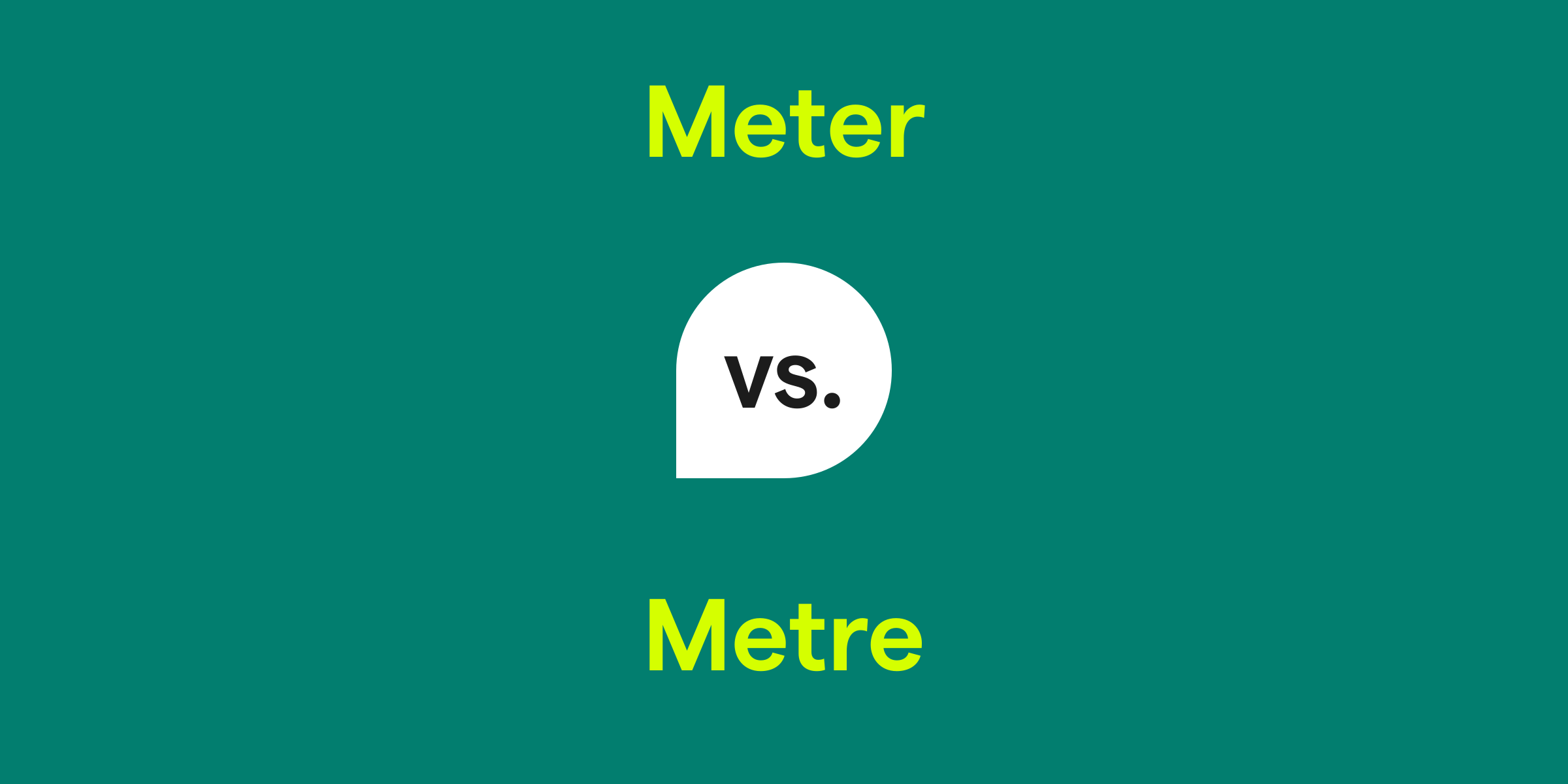Meter vs. Metre: What's the Difference?
Meter and metre are two spellings of the same word, which refers to a unit of measurement in the metric system equal to 100 centimeters. The difference lies in the geographic or cultural preference: meter is the preferred spelling in American English, while metre is preferred in British English and other forms of English outside the United States.

How do you use the word meter in a sentence?
In American English, one would use meter when discussing measurements, especially in scientific and technical contexts. The word meter specifically refers to a unit of length that is part of the International System of Units. Additionally, meter can also refer to a device that measures things like water, gas, or electricity usage.
Examples of meter in a sentence
- The laboratory equipment included a meter for measuring electrical resistance.
- We installed a new water meter to accurately monitor our household consumption.
- The athlete completed the sprint in less than 20 seconds, a record time for the 200-meter dash.
How do you use the word metre in a sentence?
In British English and most other forms of English outside the United States, metre is used when referring to a measurement of length. Just like meter, metre is part of the International System of Units and is used in similar contexts. When writing in a British English context, it is important to maintain consistency and use metre.
Examples of metre in a sentence
- Please cut the fabric into lengths of three metres each.
- The swimming pool is ten metres in width and twenty-five metres in length.
- They are building a new hundred-metre tall skyscraper in the city centre.
Meter and metre definition, parts of speech, and pronunciation
Meter definition:
In the context of American English, a meter is a unit of length in the metric system equivalent to 100 centimeters. A meter is also a device that records the amount of a substance used, such as electricity, water, or gas.
Meter parts of speech:
Meter pronunciation:
Meter is pronounced as /ˈmiː.tər/, with emphasis on the first syllable.
Metre definition:
In British English, metre denotes a unit of measurement equivalent to 100 centimeters, part of the International System of Units used to measure length. It can also refer to the pattern of rhythm in a poem.
Metre parts of speech:
Metre pronunciation:
Metre is pronounced as /ˈmiː.tə/, identical to 'meter' and varies with regional accents.
In the context of American English, a meter is a unit of length in the metric system equivalent to 100 centimeters. A meter is also a device that records the amount of a substance used, such as electricity, water, or gas.
Meter parts of speech:
- As a noun, meter represents a unit of measurement: The race was 400 meters in length.
- Used as a noun, meter can also mean the device that performs measurements: The taxi driver started the meter as soon as we got into the car.
Meter pronunciation:
Meter is pronounced as /ˈmiː.tər/, with emphasis on the first syllable.
Metre definition:
In British English, metre denotes a unit of measurement equivalent to 100 centimeters, part of the International System of Units used to measure length. It can also refer to the pattern of rhythm in a poem.
Metre parts of speech:
- As a noun, metre refers to a measure of length: He jumped over a two-metre high fence with ease.
- Used poetically as a noun, metre also describes the pattern of beats in poetry: The poet carefully chose an iambic metre for his sonnet.
Metre pronunciation:
Metre is pronounced as /ˈmiː.tə/, identical to 'meter' and varies with regional accents.
Meter vs. metre in a nutshell
The essential difference between meter and metre is the variant of English in which they are used. Meter is the American English spelling for the unit of length as well as the measurement device. Metre is the spelling adopted by British English and other English-speaking countries for the same measurement unit and, within the context of poetry, the rhythm structure. Pronunciation for these terms remains largely identical. Choosing the correct form depends on the audience and the form of English being used, as the spelling can cue readers to the type of English they are encountering.
Get AI Writing Assistance Wherever You Type
Make sure your vocabulary is on point and every punctuation mark is in the right place, no matter where you’re working. Grammarly works across more than 500,000 websites and apps so you can improve your writing without copying, pasting, or breaking focused.

More Commonly Confused Words
Interest piqued? Pore (not pour) over other commonly confused words to help your writing reach peak (not peek) performance.